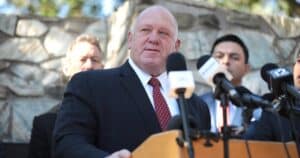President Trump Ends Security Detail for Dr. Anthony Fauci: Report
President Donald Trump has confirmed the termination of Dr. Anthony Fauci's taxpayer-funded security detail, a measure initially implemented to protect him from pandemic-related threats," Fox News reported.
In 2020, the National Institutes of Health requested a security detail for Dr. Fauci due to threats received while he was a prominent public health official during the COVID-19 pandemic.
This security was meant to protect Fauci as he guided the nation through one of its most challenging public health crises.
Security Removed From Former Officials
CNN reported that the security detail for Dr. Fauci was officially withdrawn on Thursday night. The decision to revoke this protection was discussed by President Trump while visiting Asheville, North Carolina, to offer support to areas impacted by Hurricane Helene. The move to remove security aligns with similar actions Trump has taken, such as withdrawing details for former national security advisor John Bolton and former Secretary of State Mike Pompeo.
Trump has been vocal about his stance on providing prolonged security details for former government officials. "I think, you know, when you work for government, at some point your security detail comes off and, you know, you can't have them forever," stated Trump. His perspective underscores a belief that these protections should not be indefinite.
Fauci's Notable Role During Pandemic
Dr. Fauci, who served as the director of the National Institute of Allergy and Infectious Diseases from 1984 to 2022 and as chief medical advisor from 2021 to 2022, played a pivotal role in the nation's pandemic response. Initially, President Trump supported Fauci's recommendations and awarded him, as well as others, with presidential commendations for their involvement in developing coronavirus vaccines in 2021. Nevertheless, their relationship soured over time, with Trump later becoming critical of Fauci.
In his remarks, Trump explained that the decision to revoke security was not limited to Fauci. "We took some off other people, too," he said, emphasizing that government positions do not guarantee lifelong protection. Trump also conveyed that those affected by these decisions have the means to provide for their own security, saying, "They all made a lot of money. They can hire their own security."
Implications of Revoked Security
The President's decision is not without controversy. Critics argue that removing security details from individuals like Dr. Fauci could expose them to risks related to their previous government roles. Despite these concerns, Trump remained firm in his decision, stating, "Certainly I would not take responsibility," if any harm were to befall individuals like Fauci or Bolton following the removal of their security.
In a notable political move, President Joe Biden proactively offered Dr. Fauci a pardon to protect him from potential repercussions under the Trump administration. This gesture highlights the contentious political climate surrounding figures who were central in managing the COVID-19 pandemic.
Security Decisions Related to Other Revocations
Trump's revocation of security provisions also extended to other political figures. The President rescinded the security clearances of 51 intelligence officials citing their incorrect stances regarding Hunter Biden's laptop. This action further illustrates Trump's approach to reconsidering security arrangements for former officials.
While former allies and colleagues of Dr. Fauci express concern for his safety and the potential precedent such revocations set, Trump's administration continues to prioritize re-evaluating security needs based on the current context rather than historical roles or threats.
Conclusion and Reactions
The development has drawn mixed reactions from political circles. Supporters of Trump's approach to reallocating resources wherever possible applaud the move, while others worry about the precedent of leaving key public figures unprotected post-tenure. The issue remains a point of contention as the public grapples with the balance between government accountability and personal security for former officials.
As Dr. Fauci and others affected navigate these changes, the implications of losing such government-provided security continue to unfold. The national conversation around the responsibilities and limitations of protection for former government officials is likely to persist, fueled by such prominent decisions and their subsequent impacts.




